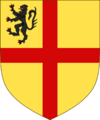Ulick de Burgh, Lord Dunkellin facts for kids
Quick facts for kids
Lord Dunkellin
|
|
|---|---|
| Member of Parliament for Galway County |
|
| In office 1865–1867 Serving with William Henry Gregory
|
|
| Preceded by | Sir Thomas Burke, 3rd Baronet |
| Succeeded by | Hubert de Burgh-Canning |
| Member of Parliament for Galway Borough |
|
| In office 1857–1865 Serving with Anthony O'Flaherty
John Orrell Lever |
|
| Preceded by | Martin Joseph Blake |
| Succeeded by | Michael Morris |
| Personal details | |
| Born |
Ulick Canning de Burgh
12 July 1827 |
| Died | 16 August 1867 (aged 40) London |
| Nationality | British |
| Political party | Whig / Liberal |
| Parents |
|
| Relatives |
|
| Alma mater | Eton College |
| Military career | |
| Allegiance | |
| Service/ |
|
| Years of service | 1846–1856 |
| Rank | Lieutenant-Colonel |
| Commands held | Coldstream Guards |
| Battles/wars | Siege of Sevastopol (1854) |
Ulick Canning de Burgh, Lord Dunkellin (born July 12, 1827 – died August 16, 1867) was an important figure in British and Irish history. He was a soldier and a politician. He served in the Crimean War and worked as a military secretary in India. He also represented the areas of Galway Borough and County Galway in the British Parliament.
A statue was put up in his honor in Eyre Square, Galway, in 1873. It celebrated his military and political work. However, after Ireland became independent in 1922, the statue was taken down. This was partly because his brother, Hubert de Burgh-Canning, 2nd Marquess of Clanricarde, was a very unpopular landlord in County Galway.
Contents
Early Life and Family
Ulick Canning de Burgh was the oldest son of Ulick de Burgh, 1st Marquess of Clanricarde. His mother was Harriet Canning. Her father was George Canning, a famous British politician. Ulick went to Eton College, a well-known school in England.
His Time in the Military
Lord Dunkellin was a Lieutenant-Colonel in the Coldstream Guards. This was a very important part of the British Army. From 1846 to 1852, he worked as an Aide-de-Camp to the Lord Lieutenant of Ireland. This person was like the King's representative in Ireland.
Later, he served in the Crimean War. This was a big conflict between 1853 and 1856. During the Siege of Sevastopol, he was captured. In 1856, he became the Military Secretary to the Governor-General of India. This was his uncle, Charles Canning, 1st Earl Canning.
A Career in Politics
Lord Dunkellin also had a successful political career. He became a Member of Parliament (MP). This means he was elected to represent people in the British government.
- He represented Galway Borough from 1857 to 1865.
- Then, he represented County Galway from 1865 to 1867.
He was part of a group called the "Adullamites." In 1866, he proposed a change to a law about how people could vote. This change led to the government of John Russell, 1st Earl Russell losing power.
Later Life
Lord Dunkellin had health problems for many years. He passed away in London in August 1867. He was 40 years old. He died seven years before his father. He never married. His younger brother, Hubert de Burgh-Canning, 2nd Marquess of Clanricarde, took over his father's title after their father passed away.
Images for kids
 | Percy Lavon Julian |
 | Katherine Johnson |
 | George Washington Carver |
 | Annie Easley |


